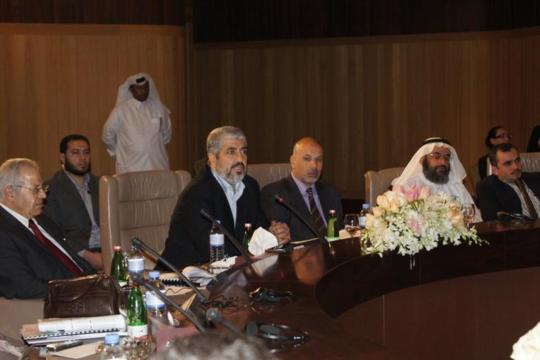
The event provided an opportunity for the issue of Palestinian refugees to be addressed from multiple perspectives and for light to be shed light on the political, legal and social dimensions of the refugee question. The seminar linked the issue to the Arab revolutions, which include many countries of the region, and arrived at recommendations and visions for the future.
As emphasised by Dr. Hassan Al-Nimah, a board member of the AlJazeera Network, the network has succeeded since its inception on shedding light on the vital and crucial issues that interest the nation. The seminar was thus in line with the network’s vision. Dr. Al-Nimah also stressed that the issue of Palestinian refugees is old but persists in its political and social dimensions. He pointed to the existence of interlocking relationships between the issue of refugees and the policies and strategies of the countries in the region surrounding Palestine. The Director of AlJazeera Center for Studies, Dr. Salah Eddin Elzein, said that discussions of the refugee issue were critical at a time when the people of the Arab region in general and those surrounding Palestine in particular were making towards unprecedented political and social shifts.
According to Mr. Majed Al-Zeer, Director of Palestine Return Centre in London, the issue of Palestinian refugees remains the basis of the conflict in the Arab region and will continue to ‘haunt Zionism’ for as long as the term ‘refugees’ remains in the political lexicon and the refugee camps remain in the countries surrounding Palestine. Therefore, he said, it was necessary to open a wide debate about the ordeals faced by refugees in some Arab countries and the future impact on the refugees.
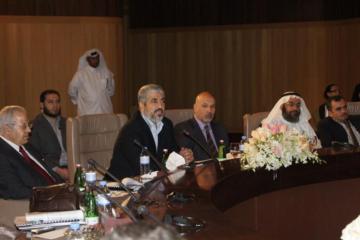 |
Return of refugees and exiles: A right awaiting implementation
The most serious event in modern Palestinian history was the Nakba (catastrophe), an earthquake that resulted in consecutive multiple aftershocks that continue to this day. The largest of these shocks is the issue of refugees, which is considered the longest case of refugeehood known to mankind. To date, the international and Arab communities have not yet found a just solution based on the right of these refugees to return to their homes as stated by United Nations resolutions in this regard. An understanding of the right of return and its implementation requires a study of three basic elements: Palestinian land, the Palestinian people and the plethora of international laws related to this right.
Dr. Salman Abu Sitta, the general coordinator of the Right of Return conference and founder and chairman of the Palestine Land Society in London, raised a number of pertinent issues in his paper ‘Plan to Return: A Reality Awaiting Implementation’. The Palestine Land Society is one of the most comprehensive documentation projects with one of the most accurate databases of information related to Palestine since the British Mandate, through the subsequent Nakba and its results – including the enforced displacement of Arabs and Jewish settlement. In addition, about half a million records from Palestinian owners are kept at the United Nations Conciliation Commission for Palestine (UNCCP).
Three-quarters of the 11 million Palestinians are refugees – two-thirds of whom were displaced in 1948 and the rest after the 1967 defeat and the occupation of the West Bank and Gaza Strip. Thus, three-quarters of the Palestinian people do not live in their homes but are in exile and in refugee camps in countries hosting the Diaspora. Abu Sitta’s project Atlas of Palestine, which was published in both Arabic and English, uses maps, provides information and clarifies facts that determine the whereabouts of Palestinians in the camps. It also includes maps of their villages and locations in the land of Palestine. This means that it is possible to arrange the return of refugees from camps and the diaspora to their villages of origin.
The legal framework for the return of refugees is clear and obvious and has been applied in Kosovo, Bosnia, Abkhazia, Uruguay, Uganda, South Africa, Iraq and Afghanistan; it can also be applied to the Palestinian people. There are numerous examples of effective international measures in Kosovo, Bosnia and East Timor. There is a definite organic correlation between the right of return and the abolition of Zionism. Furthermore, respect of and abiding by international law – particularly human rights law – means that the return of refugees to their homeland is a logical and normal expectation.
There remain many difficulties facing researchers in the field of Palestinian refugees, notably the lack of regular and updated data about the reality of the refugees, both in terms of statistics as well as in terms of legal and political variables and the dissimilarities between various studies.
As Khaled Mesh’al, the president of the Political Bureau of Hamas, said, the right of return of Palestinian refugees is sacred and cannot be waived or bargained away. Despite the suffering and pain of the Palestinian people, the refugee issue is a point of strength for Palestinians, not a weakness. It is an individual and a collective right that no one can remove from the Palestinian people. The participation of Palestinians in the political life in this or that Arab country cannot be considered a way to introduce their settlement in those countries. Even though Palestinians value and are proud of all Arab countries, they cannot accept a substitute for their historic land.
No noteworthy change has taken place in the Israeli position towards the issue of refugees since the Israeli occupation of Palestinian territory – neither in wartime nor in peace. The reason is simple: Israel strongly believes that the existence of Palestinians on their land undermines the basis of the Zionist project with its aim of establishing a Jewish state on the land. This project is based on the myth that Palestine was a land without a people.
Discussions during the two-day seminar confirmed the political pre-eminence of the refugee issue and the right of return for the peace process and noted the decline of a focus on the issue in the last years.
As the Arab street has regained its status and its voice after the overthrow of many authoritarian regimes, the issue of refugees and the right of return may regain its political position by virtue of the fact that Palestinian refugees in the diaspora are an essential part of the fabric of the activists of the Arab spring. The march of return to Palestinian borders (in Syria, Lebanon, Jordan and Egypt) on 15 May 2011 was nothing but evidence of the willingness of refugees to offer martyrs for their anticipated spring.
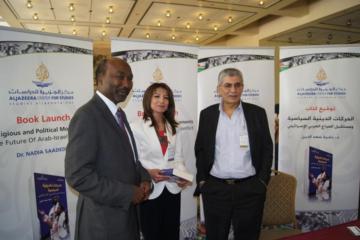 |
UNRWA... Significant decline and an essential roleAmong the salient points covered in the presentations and debates at the seminar was the quandary of the United Nations Relief and Works Agency for Palestine Refugees (UNRWA). Although there is no precise description of the services offered by this agency, it has thirty donor countries with a combined total annual contribution of about 400 million dollars. All the donations of Arab countries together amounts to one per cent only, while the other ninety-nine per cent is provided by the United States, European Union and Scandinavian countries. The agency faces a real crisis in regards of its financial resources as some countries have discontinued their contributions. Canada, for example, stopped in February 2010, arguing that the money goes to Hamas, and thus their money contributes to support an agenda of hatred for Israel. A conference held in Vienna on 23 June 23 to raise funds for the reconstruction of Nahr el-Bared camp in Lebanon yielded no significant results. Indeed, some western countries exerted pressure on UNRWA in an effort to dissolve it. Thus, assistance to Palestinian refugees has become conditional donations.
The dissolution of UNRWA – if agreed on by UN members – will affect not only the refugees but also the Arab host countries since there will be no alternative but the settlement of refugees in these countries and for them to bear all the costs related to such a situation. This scenario is rejected by the refugees and by most host countries. It is necessary to reject attempts to end the role of UNRWA and to hand over its services to the UN High Commissioner for Refugees (UNHCR) or transfer its powers to the host countries. Indeed, seeking to improve the performance of UNRWA and to develop its services is obligatory until a just resolution to the refugees’ problem is reached.
Palestinophobia…Why are they afraid of Palestinian demographic growth?
The phenomenon of Palestinian refugees created what was referred to in the symposium as ‘Palestinophobia’. This refers to a fear of the demographic or political Palestinian factor resulting from the presence of Palestinian refugees in host countries. There are numerous examples of strained relationships between Palestinian refugees and host countries. One example is the armed confrontation in 1970-71 between the Palestine Liberation Organization (PLO) and the Jordanian regime in what was called Black September. The armed presence of the PLO was eliminated and the tense relations based on a fear of the so-called ‘homeland alternative’ remains until today. In Lebanon, the famous events of Tel al-Zaatar and the subsequent persecution by Syrian security services against ‘quarrelsome’ Palestinian elements is still remembered. The refugee issue has posed a number of problems for Lebanon as well; the driving out of the Palestinian armed wing from Lebanon after the Israeli invasion and the siege of Beirut in 1982; the events of Nahr el-Bared and Beddawi; the massacres of Sabra and Shatila; the siege of of Burj Barajneh, Sabra, and Shatila camps during the tragedy known as ‘the war of the camps’ between the Amal movement and Palestinian forces and other military clashes.
Palestinian refugees in Iraq also experienced great suffering with hundreds murdered, imprisoned and tortured, according to researcher Mohamed Mshinsh, for reasons related to ‘sectarian charges’. The targeting of Palestinians in Iraq took a sectarian form sometimes coinciding with ideological motives. At other times it was based on certain perceptions of the Palestinian presence in Iraq and that their number was too large, or that they allegedly had links to the regime of former Iraqi president Saddam Hussein.
In the seven years from 2003 to 2009, violations against Palestinian refugees in Iraq by Iraqi sectarian militias – sometime using certain political parties as a cover – resulted in their flight from Baghdad and other areas to camps in the Iraqi desert – lacking in the most basic elements of decent living – on the borders with Syria and Jordan. A particularly difficult period for Palestinian refugees in Iraq was 2006 with 1 739 documented violations against them. In spite of the small number of refugees, none of the Arab countries agreed to house them. The UN then launched a project to resettle them in countries that would accept them, resulting in a new tragedy whereby a single family might be displaced in several countries such as Brazil, Sweden, Norway, India, Australia and Cyprus.
Palestinian Refugees and the Arab Spring
The Palestinian question – including the refugees’ issue – persists but is limited to a tactical slogan in the ‘Arab spring’. It does, however, appear in some manifestations of this spring as an issue of concern to the nation. The uprising Arab youth did not hold banners or slogans for Palestine, which is due in part to the fact that the uprisings took local orientations from the beginning, primarily dealing with local burdens and aspirations. This explains the absence of logos and banners with regional and international dimensions. There was no overt support for the Palestinian cause and no condemnation of Israeli and American policies. Additionally, the spontaneity and lack of organisational structure caused the Arab uprisings mainly to echo local socio-political demands. It is likely that there is a conviction among Arab youth that they cannot support the Palestinians while their hands are tied with the chains of authoritarian regimes. Political reform and a democratic approach is a necessity and, if achieved, may allow the presentation of the Palestinian issue more broadly especially after the ousting of authoritarian regimes that had used the Palestinian issue as a way to delay and justify domestic problems.
In the midst of the Arab ‘revolutions’ and Palestinian reconciliation, Palestinian refugees organised marches known as ‘Marches of Return’. Their objective was to push for reconciliation between Palestinian parties and place the right of return in the spotlight. During the first months of the Syrian Revolution, these rallies had avoided involvement in the Syrian crisis. The organisers refused the use of refugees in the conflict – either by the Syrian regime or by Palestinian factions.
One of the papers presented at the seminar addressed the critical situation of Palestinian refugees in Syria, especially since the beginning of the revolution. The paper discussed the role of certain Palestinian organisations in controlling the refugee camps and Palestinian society in a manner that has benefited the Syrian regime. The paper also pointed to the support of some Palestinian groups to the ‘Syrian revolution’ which made them vulnerable to arrest and execution. The researcher estimated the death toll at sixty-one Palestinians by the end of March 2012. The paper was contested, especially since Palestinians make up for more than two per cent of Syria’s population and enjoy civil rights – but without political rights – equivalent to those of the locals. Most comments stressed the commitment of the Palestinians to neutrality regarding events in Syria.
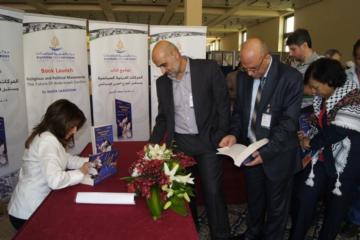 |
Israel contradicts Palestinian right of return
The danger in the concept of a Jewish state, which Israel demands Palestinians must recognise as a precondition for any peace negotiations, is that it publicly renounces the Palestinian right of return. This persistent propaganda will create a new Nakba (catastrophe), especially under the policy of expulsion (or ‘transfer’) that the Israeli government will force onto the Palestinians who lived within the territory of Palestine in 1948. The aims of the Zionist movement through this are to recognise the legitimacy of the existence of Israel on Palestinian land and make it free of non-Jews, as was emphasised by the director of the Arab Center for Research and Policy Studies, Dr. Azmi Bishara.
There is also a stark contrast between the recognition of the right of return and the recognition of Israel as a Jewish state; it is wrong to underestimate the recognition of Israel. This concept existed even before Ariel Sharon’s speech in June 2003 when he called on the Palestinians and the world to recognise Israel as a Jewish state. Zionism is nothing but a movement that has relied, since its inception, on secularising the concepts of the Torah. The most conspicuous of these is the salvation of the people of Israel from the Gentiles and the fact that Israel is a homeland for every Jew, regardless of where she or he resides. It is also based on the revival of myths from the Torah and their employment to enable the rooting of the idea of a Jewish Israel.
Recognising Israel as a Jewish state means renouncing the refugees’ right of return. To address this notion of the Jewishness of Israel imposed by Israel and confirmed on more than one occasion by US officials, Palestinian factions and Arab powers must return to marking the anniversary of the Nakba, which began in 1948 in the collective Arab minds, and place it in the spotlight for the western mind as in the case of the Holocaust.
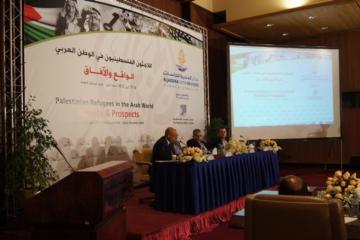 |
Conclusions opening up multiple perspectives
The symposium drew conclusions on the status of refugees in Arab countries, especially in terms of enhancing proper public awareness of the Palestinians’ right of return – particularly for youth in schools and universities – and assessing the current reality of the status of Palestinian refugees in terms of the five areas of UNRWA’s operations: Lebanon, Syria, Jordan, the West Bank, Gaza, and the rest of the Arab world.
The conclusions underlined the importance of discussions that aid in determining the official vision of Arab countries for resolutions of the refugee issue. It also stressed linking the issue with Palestinian historical rights and to interact with the various forces and Arab civil society institutions to enrich a positive approach to the issue of the return.
Participants also emphasised the need to document the names of refugees and to take advantage of the current context of digital and communication technology, as the studies no longer require huge budgets as in the past, especially with the benefit of social networking, the internet and technological and statistical tools.
Documentation of the names of Palestinian refugees, their origins and using a communication mechanism remain indispensable requirements. However, the process should take place away from any partisan umbrella. Documentation of the Palestinian refugee population should be based on surveys of their number, specifying their geographical distribution, age groups, specialties, and the possibility of communicating with them in order to obtain greater detail. In addition, it is important to issue identity cards to all refugees which include names, locations and other identifying information.
Some outspoken advocates called attention to the importance of communication and meetings among Palestinians in events that embodied the Palestinian identity among youth as a resistance identity proud of its affiliation to the Arab and Islamic spheres.
It is incumbent to pressure international institutions, primarily UNRWA, in order to integrate the Palestinian identity and the Palestinian heritage in educational curricula provided to generations of refugees. This should be used as an important approach to building the capabilities of Palestinian youth and guiding their activities.
It is essential to optimise the changes arising from the Arab spring and eliminate the negativity and fear in order to restore respect for the Arab spirit and the common concern, and placing the Palestinian cause at the centre of transitions.
Seminar Papers:
| No. | Paper | Author | |
| 1. | A Right to Take Part? Refugee Participation in the Negotiation of Durable Solutions. | Terry Rempel | For FULL paper, please click here. |
| 2. | Legal Reflections on Count Folke Bernadotte's Proclamation on the Exodus of Palestinian Refugees. | Basheer Alzoughbi | For FULL paper, please click here. |
| 3. | International Law on State Responsibility and the Exodus of Palestinian Refugees. | Basheer Alzoughbi | For FULL paper, please click here. |
| 4. | The Syrian Revolution and Palestinian Refugees in Syria: Realities and Risks. | Magda Qandil | For FULL paper, please click here. |
| 5. | Palestinian Refugees: A Crisis of Recognition. | Haneen Abou Salem | For FULL paper, please click here. |